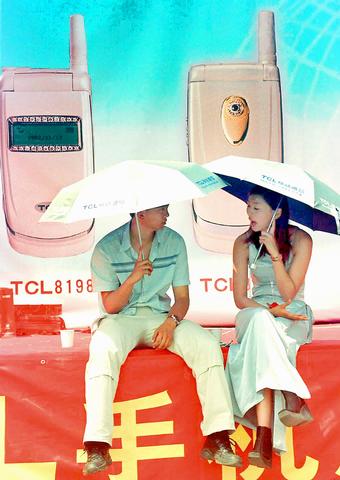Taiwan's Hsinchu Science-based Industrial Park will expand by 29.2 hectares, thanks to land acquired from the Ministry of National Defense, officials said yesterday.
The new space at the crowded, 605-hectare industrial park will make room for two additional 12-inch chip fabs and an IC design center.
DRAM makers Macronix International Co (

PHOTO: AFP
The land, formerly the Du-hsing military base (
At a ceremony yesterday, President Chen Shui-bian (
New facilities on the land are expected to be completed by 2005.
The president said a partnership between the public and private sector made the project possible. Chen also praised the defense ministry, which agreed to relocate the army base to make room for the high-tech firms.
Because of rapid growth and high concentration of tech companies, the Hsinchu Science-based Industrial Park is known as Taiwan's Silicon Valley.
The park is home to 312 technology firms, including the nation's two biggest chipmakers, Taiwan Semiconductor Manufacturing Co (
But a shortage of space at the park has forced companies to look to places such as Singapore to set up new chip fabs.
After an environmental impact assessment was completed and the 29.2 hectares rezoned for industrial use, the project was able to move ahead yesterday.
Officials say a sewage treatment plant will also be built on the property to treat waste water generated from the firms.
Yesterday's ground-breaking ceremony was hosted by Wei Che-ho (
"We hope to complete construction by the end of 2005," Wei said.
Hsinchu County Commissioner Cheng Yung-chin (
Earlier this month, officials from the National Science Council said that a fault line running through the property shouldn't be a problem. Under the property's environmental impact assessment, buildings will be required to be 50m from each other.
Tougher building codes have also been adopted.
According to geologists from National Taiwan University, who inspected the fault line, the area has been inactive for roughly more 30,000 years, although that doesn't preclude the possibility of future seismic activity.

Sweeping policy changes under US Secretary of Health and Human Services Robert F. Kennedy Jr are having a chilling effect on vaccine makers as anti-vaccine rhetoric has turned into concrete changes in inoculation schedules and recommendations, investors and executives said. The administration of US President Donald Trump has in the past year upended vaccine recommendations, with the country last month ending its longstanding guidance that all children receive inoculations against flu, hepatitis A and other diseases. The unprecedented changes have led to diminished vaccine usage, hurt the investment case for some biotechs, and created a drag that would likely dent revenues and

Global semiconductor stocks advanced yesterday, as comments by Nvidia Corp chief executive officer Jensen Huang (黃仁勳) at Davos, Switzerland, helped reinforce investor enthusiasm for artificial intelligence (AI). Samsung Electronics Co gained as much as 5 percent to an all-time high, helping drive South Korea’s benchmark KOSPI above 5,000 for the first time. That came after the Philadelphia Semiconductor Index rose more than 3 percent to a fresh record on Wednesday, with a boost from Nvidia. The gains came amid broad risk-on trade after US President Donald Trump withdrew his threat of tariffs on some European nations over backing for Greenland. Huang further

CULPRITS: Factors that affected the slip included falling global crude oil prices, wait-and-see consumer attitudes due to US tariffs and a different Lunar New Year holiday schedule Taiwan’s retail sales ended a nine-year growth streak last year, slipping 0.2 percent from a year earlier as uncertainty over US tariff policies affected demand for durable goods, data released on Friday by the Ministry of Economic Affairs showed. Last year’s retail sales totaled NT$4.84 trillion (US$153.27 billion), down about NT$9.5 billion, or 0.2 percent, from 2024. Despite the decline, the figure was still the second-highest annual sales total on record. Ministry statistics department deputy head Chen Yu-fang (陳玉芳) said sales of cars, motorcycles and related products, which accounted for 17.4 percent of total retail rales last year, fell NT$68.1 billion, or

Macronix International Co (旺宏), the world’s biggest NOR flash memory supplier, yesterday said it would spend NT$22 billion (US$699.1 million) on capacity expansion this year to increase its production of mid-to-low-density memory chips as the world’s major memorychip suppliers are phasing out the market. The company said its planned capital expenditures are about 11 times higher than the NT$1.8 billion it spent on new facilities and equipment last year. A majority of this year’s outlay would be allocated to step up capacity of multi-level cell (MLC) NAND flash memory chips, which are used in embedded multimedia cards (eMMC), a managed